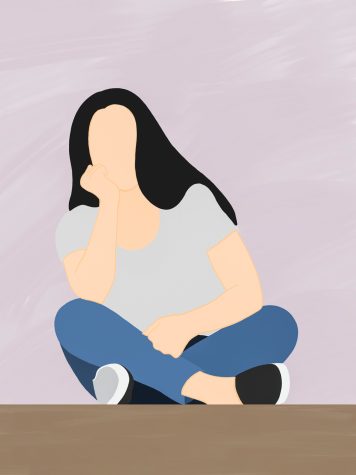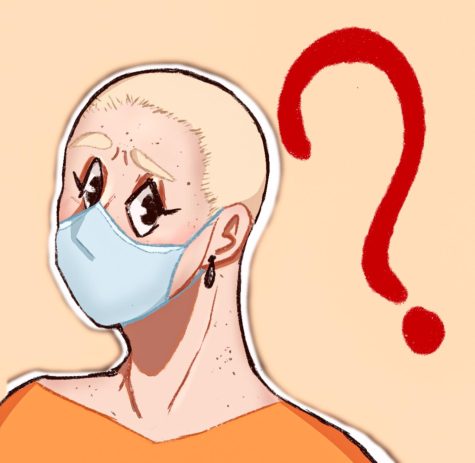OPINION: Should WSU keep mask mandate on campus?
As case rates drop, students feel comfortable relaxing mask use in most situation
Masked students study in the Compton Union Building on Feb. 22.
February 24, 2022
My least favorite part about COVID-19 restrictions has not been quarantine, school closures or physical distancing. Rather, it has been the mask mandates.
While quarantine was certainly detrimental to my mental health, as it was for many others, I also view quarantine in a positive light. Being homebound allowed me to gain new perspectives on the meaning of life and discover things about myself that I would not have without staying home for a few months.
But with masks, it has caused more social disruption than anything else. On top of making facial expressions — something that is vital for nonverbal communication — nearly impossible to read, it has also created a huge sociopolitical divide.
For example, regardless of whether or not you choose to wear a mask, there are always going to be people who will judge or fight you on your decision.
Last summer, when mask mandates across the country were lifted, many people still opted to wear a mask. As a result, some of these people received very negative reactions from others.
As crazy as it sounds that people would get upset over someone wearing a mask, there have indeed been cases of people attacking others for wearing a mask.
Mask mandates also put a lot of pressure on business owners and authoritative figures who face the fear of being attacked or verbally harassed for trying to enforce a state-mandated policy.
So, when Gov. Jay Inslee recently announced that Washington is lifting its indoor mask mandate on March 21, many people felt a sense of relief. Maybe, just maybe, this is the last step needed to put this pandemic behind us.
However, it is not as simple as it sounds.
We already removed our mandate for vaccinated individuals once before, and the result was a rising number of cases that required the mandate to be reinstated. There is no guarantee the same thing will not happen again.
Additionally, the stigmatization I just referred to is not going away either. People are still going to be judged, harassed or attacked for wearing a mask or not wearing one. The only difference is there is no government order advocating for either side.
There are also a lot of divided opinions on lifting the mandate. While many are happy about it, many are scared that lifting the mask mandate is going to put their health in danger.
Spencer Falk, junior criminal justice major, said he thinks lifting the mandate is OK as long as scientists and doctors say it is ok.
“I think I’m gonna continue wearing my mask at first just to see if [COVID-19] breaks out from it,” Falk said.
However, he also said electing not to wear a mask should be dependent on the case rate of where you live. If cases are down at WSU and Whitman County, Falk said he would be comfortable not wearing one.
Sophomore marketing major Katey Morehouse said she is confused by the news of the mandate being lifted because COVID-19 is still circulating, but ultimately does not have any strong opinions on the matter. She believes people should choose whether or not they want to wear one.
Of course, personal choice comes with that stigmatization. It is unrealistic to gain public acceptance right away just because you personally choose not to wear a mask.
Brittany Vandenberg, doctoral candidate in molecular biosciences, said she is conflicted on the matter.
Vandenberg said she teaches a molecular biology course. On one hand, she said she likes the security of people in her class wearing masks, but also said she understands people are sick of wearing them.
“I’m triple vaccinated,” she said. “If you’re vaccinated, I think you’re OK as long as everyone else around you is comfortable, but it really depends on the situation.”
I firmly believe masks are a situational thing.
So far, most of society has seen masks as an “all-or-nothing” ordeal, when that is simply not the case. There should be situations where it is left up to interpretation even without a government order.
Social courtesy plays into this. We often ask people to modify their behaviors for us to feel comfortable.
A personal example I have of this is I often will ask people not to raise their voice around me, as it makes me feel uncomfortable. Most people I talk to about it respect that.
The same thing carries over to masks. If someone is uncomfortable with you not wearing one, especially if you’re in close quarters with them, it is courteous to put on a mask to make them feel at ease.
Mask mandates are extremely nuanced, and there is no simple answer as to whether people should wear one. However, something I am curious about is if WSU should keep its mask mandate or remove it right after the state does.
“I think that’s a very tough question, and I feel for the people who are in charge of making that decision,” Vandenberg said.
She said she encourages empathy for decision-makers. Even if their decision is unfavorable, it is important to recognize they are only doing what is best for the public, she said.
“I feel like it might be a good idea to keep it [at WSU] because the classrooms are tiny,” Morehouse said.
Falk said he believes if the state lifts the mandate, WSU should as well.
There is no doubt that it is a tough decision because of how divided everyone is on the topic. I agree with Morehouse that classes could become an issue – cramming hundreds of unmasked people in a room could prove to be harmful in the long run.
However, I think we need to consider that the lifting of the state mandate is being made because metrics right now are low. If I can be assured I have a low chance of getting sick, then I would feel comfortable removing my mask.
However, the situational aspect is critical. You do not want to be in a crowd of 30,000 people without a mask in an indoor setting where you can easily contract COVID-19.
It is important to start off with smaller settings first, then move on to bigger settings.

















